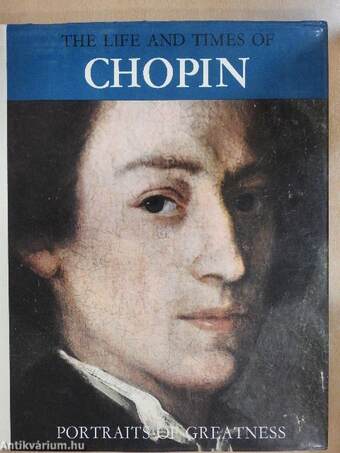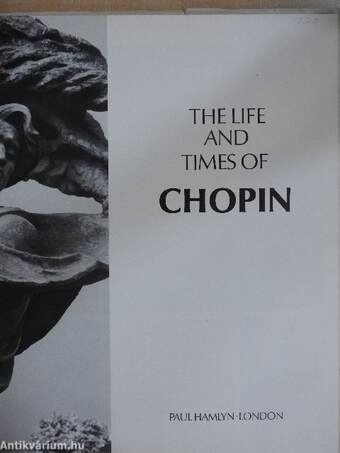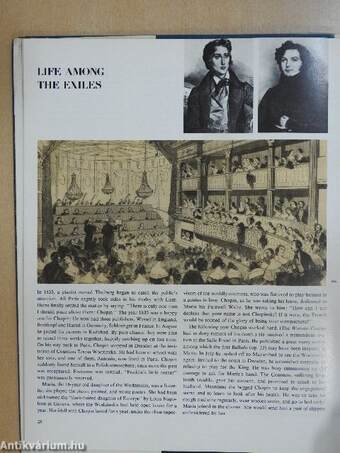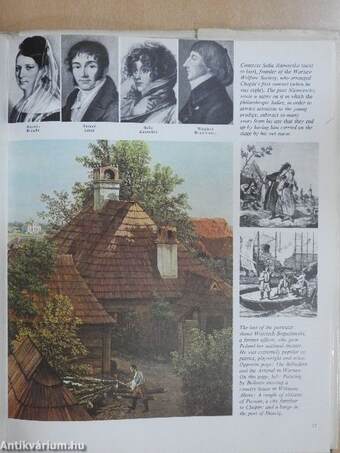1.076.445
kiadvánnyal nyújtjuk Magyarország legnagyobb antikvár könyv-kínálatát

VISSZA
A TETEJÉRE
JAVASLATOKÉszre-
vételek
The Life and Times of Chopin
Portraits of Greatness
| Kiadó: | Paul Hamlyn Ltd |
|---|---|
| Kiadás helye: | London |
| Kiadás éve: | |
| Kötés típusa: | Fűzött kemény papírkötés |
| Oldalszám: | 75 oldal |
| Sorozatcím: | The Life and Times of |
| Kötetszám: | |
| Nyelv: | Angol |
| Méret: | 29 cm x 23 cm |
| ISBN: | |
| Megjegyzés: | Színes és fekete-fehér illusztrációkkal. |
naponta értesítjük a beérkező friss
kiadványokról
naponta értesítjük a beérkező friss
kiadványokról
Előszó
TovábbFülszöveg
The Life and Times of CHOPIN
Chopin's brilliant career is bracketed in time by the two French revolutions of 1830 and 1848. He left Poland in 1830 to begin his conquest of the French capital and died there in 1849 at the age of thirty-nine.
In those supremely romantic days, a poetic pallor, rejection in love, consumption, and an early grave were the fashionable hallmarks of a person of feeling, and they were to be seen in every European city. In Chopin's case the signs were apparent but his true inner life was seldom revealed, except through his music. Naturally withdrawn and homesick for Poland, he nurtured and preserved his genius in solitude. Not even George Sand, with whom he lived for nine years, had access beyond these innermost barriers.
From the beginning Chopin lived free of material hardship. As an infant prodigy in his native Warsaw, only he, the 'little Polish Mozart', could cheer the melancholy Grand Duke Constantine with his piano recitals. Later, in Paris, he... Tovább
Fülszöveg
The Life and Times of CHOPIN
Chopin's brilliant career is bracketed in time by the two French revolutions of 1830 and 1848. He left Poland in 1830 to begin his conquest of the French capital and died there in 1849 at the age of thirty-nine.
In those supremely romantic days, a poetic pallor, rejection in love, consumption, and an early grave were the fashionable hallmarks of a person of feeling, and they were to be seen in every European city. In Chopin's case the signs were apparent but his true inner life was seldom revealed, except through his music. Naturally withdrawn and homesick for Poland, he nurtured and preserved his genius in solitude. Not even George Sand, with whom he lived for nine years, had access beyond these innermost barriers.
From the beginning Chopin lived free of material hardship. As an infant prodigy in his native Warsaw, only he, the 'little Polish Mozart', could cheer the melancholy Grand Duke Constantine with his piano recitals. Later, in Paris, he rapidly became the idol of salons and concertgoers, admired by such brilliant contemporaries as Liszt, Berlioz, Heine and Schumann. Later still, after the break with George Sand, he played with magnificent success before Queen Victoria in London and his final concert in Paris, at the Salle Pleyel, was perhaps his greatest public triumph.
Chiefly, however, he wrote and played for himself and his beloved Poland, split by wars and dominated by the might of Russia. He was not a composer of grand works in the Beethoven manner, rather he was a romantic who adored the classics, a master of the smaller forms, the nocturnes, études, preludes and dances - the waltz, the polonaise and the mazurka.
In this book the exciting atmosphere of Chopin's Paris is recreated in words and pictures. The story begins in Poland, tracing the composer's happy childhood and the flowering of his genius in Vienna, Paris and London. Over 130 paintings, drawings, photographs and engravings - 60 of them in colour - portray the man and the exciting romantic years which he transcended with his own passion and inspiration. Vissza
Témakörök
- Életrajz > Művészet > Zene
- Idegennyelv > Idegennyelvű könyvek > Angol > Művészetek > Művészettörténet, általános
- Idegennyelv > Idegennyelvű könyvek > Angol > Művészetek > Zene
- Művészetek > Zene > Komolyzene > Korszakok > Romantika
- Művészetek > Zene > Komolyzene > Életrajzok > Külföldi
- Művészetek > Zene > Komolyzene > Zenetörténet > Külföldi
- Művészetek > Zene > Komolyzene > Idegen nyelv > Angol
- Művészetek > Művészettörténet általános > Idegen nyelv > Angol
- Művészetek > Művészettörténet általános > Életrajzok > Egyéb
- Idegennyelv > Idegennyelvű könyvek > Angol > Életrajz > Művészet > Egyéb
Adelaide Murgia
Adelaide Murgia műveinek az Antikvarium.hu-n kapható vagy előjegyezhető listáját itt tekintheti meg: Adelaide Murgia könyvek, művekMegvásárolható példányok
Nincs megvásárolható példány
A könyv összes megrendelhető példánya elfogyott. Ha kívánja, előjegyezheti a könyvet, és amint a könyv egy újabb példánya elérhető lesz, értesítjük.











